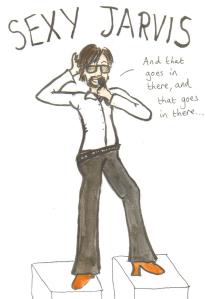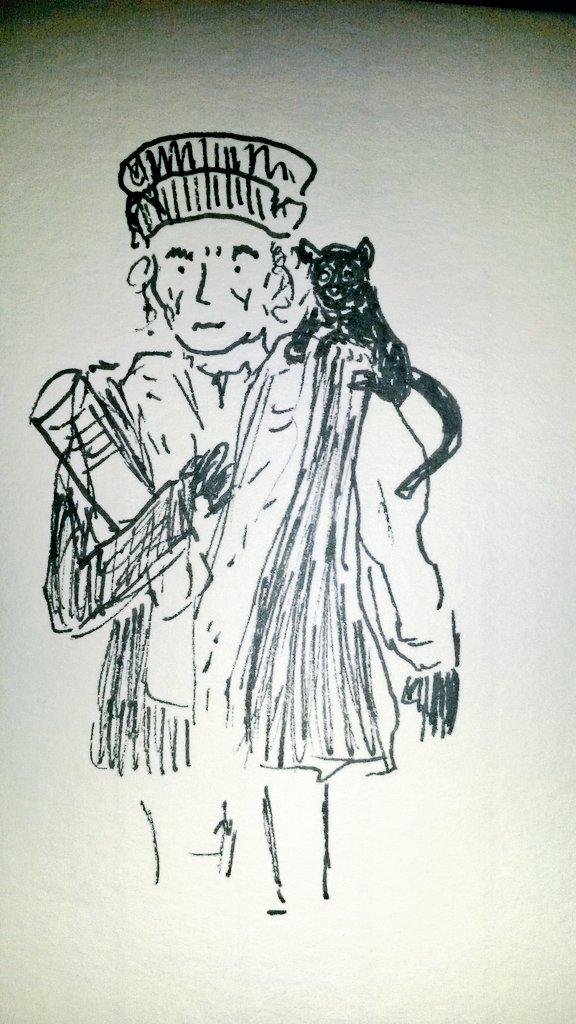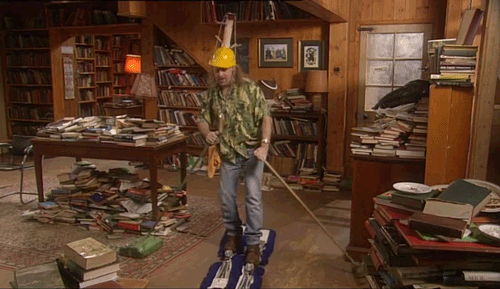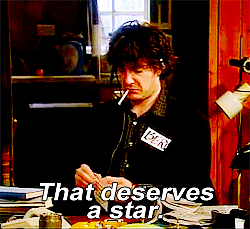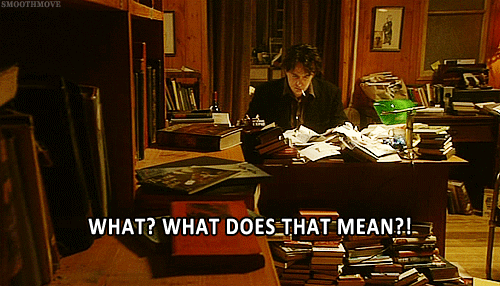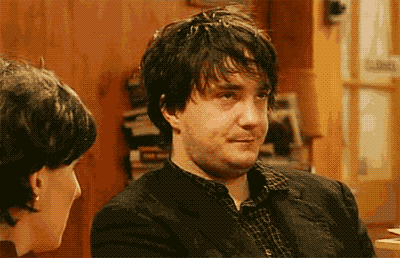It has been a long time since I posted anything on here, and the last thing I posted was a bowl with a picture of Charles II on it. I’ve been a little distracted.
The distractions have been many and various, like writing stuff and applying for jobs and all that malarkey. Especially recently, when I’ve been gearing up to move, scrounging boxes from the cash and carry and staring at my books while saying things like ‘All my friends are bibliophiles, I THOUGHT THIS WAS NORMAL’.
Anyway, apologies. Please accept a tale about a bike. It contains thrills (well, maybe not), spills (definitely), mythical hidden treasure (none at all, actually), and a moral about academia (of course) because that is (as they say) how I roll.
Happiness is a Gold Bike and a Good Book
I remember going to buy my first bike. It was at someone’s house, and the bike in question was painted in dull gold and cost my father five pounds. I used to ride it behind our house, in an alley between two lines of terraced houses, where the neighbourhood kids would congregate to muck about on bikes and kick footballs. In my brain the image of us there has blurred with history, into some approximation of a Hovis advert or a Shirley Hughes book, all earth-toned 1950s clothing and cameraderie.

Representative alleyway friends, about to embark upon game of marbles/conkers/postwar regeneration
I’m pretty sure we weren’t wearing short trousers and trading cigarette cards, but in my memory we might as well have been. I remember the boy who was my particular friend, though to my sadness I can’t remember his name, who was convinced that my five pound bike was a valuable antique under its gold paint. I borrowed a piece of sandpaper from my mum’s tool box and we tried to take the gold paint off to see what was underneath.
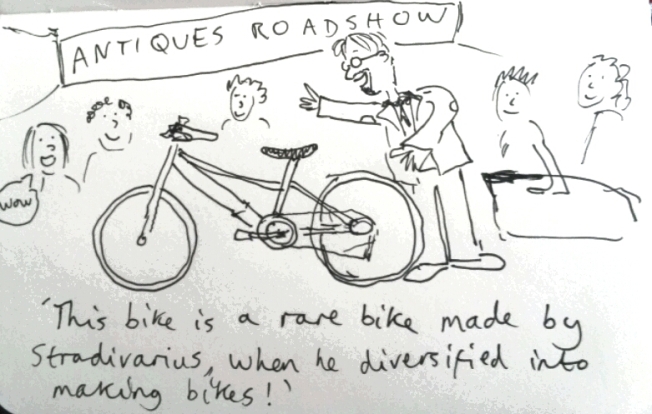
I assume this is what we thought would happen. NB. One serious flaw with this blog post is that I can’t draw bikes for toffee.
I was never that confident on the bike. I hadn’t taken particularly well to my father’s tutelage, and I never really trusted my ability to kick off from the ground and keep going, a frail travelling coincidence (to misuse a Philip Larkin quote about train travel) of balance and momentum. The bike’s last day was a fairly dramatic one. There was a park a short walk away, where a gravel path snaked through the woods that ringed a lake. The lake had once been an open-cast mine, from which they’d dug the cream-coloured clay for the bricks of the terraced houses. I was there with my family, on my gold bike, doing better than usual. Towards the end of the circle of path was a hill, and as I freewheeled down it, closer to the edge of control than I usually liked to be, the rust that was under the gold paint finally gave way and the frame of the bike sheared in half and I fell smack at speed onto the gravel. My sister still says it’s the funniest thing she’s ever seen.
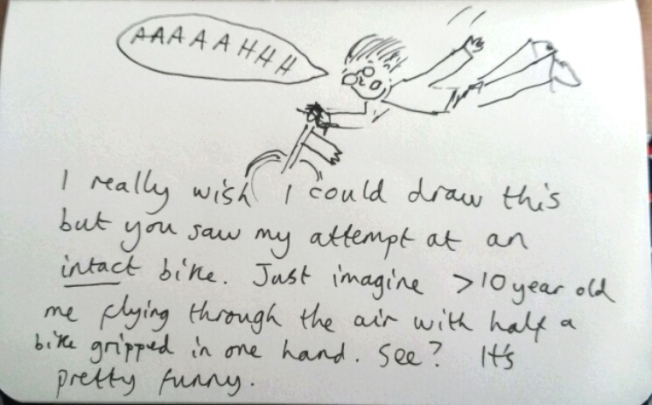
Unfortunately when you chop a bike in half it does not grow into two bikes
Anyway, this is why I didn’t ride a bike for twenty years. I was a very nervous child. Having experienced a top-speed bike collapse once, I wasn’t in any hurry to do it again. To be honest, I wasn’t really in any hurry at all. I grew up not really trusting any speed over a sprint unless someone else was controlling whatever mechanism was making it happen. I don’t drive either. I walk and I use public transport, a policy that made me pretty well-suited to living in London and not at all suited to living in most other places.
I even walked everywhere while I was an undergrad in Oxford. Oxford is a town for cyclists. It’s even a town for unsuitable cyclists, like dons on creaking ancient bikes with baskets crammed with fat books on medievalism wobbling up St Giles with long skirts flapping dangerously about the pedals, or worse-for-wear undergraduates weaving through Cornmarket at times they’re not supposed to. I walked everywhere, and when a friend’s dodgy secondhand bike suffered a fate not dissimilar to my golden one – the handlebar shearing off, tipping him into the Banbury Road traffic (he was fine, thankfully, largely due to the fact that he, unlike 90% of Oxford’s travelling coincidences, was wearing a helmet) – I took this as confirmation that cycling, like most team sports and the study of Romanticism, was a death-defying venture and something that I Did Not Do.

I would, however, act as a guide to south Devon for the consumptive Keats. He had an awful time there, which I think would be at least partly mitigated by knowing where the good pubs are.
A decade or so later, though, I am moving back to Oxford and the issue of cycling has come up again. There are buses that travel most of the distance between my new house and my new job, but it is an unavoidable fact that it would make a heap more sense to cross this distance on a bike. With this in mind I decided fairly recently, as a nearly-30-year-old who has now managed to suppress her sense of social embarrassment enough to not mind overly about teens watching her make a wobbly fool of herself in a park, to learn to ride a bike again. My old flatmate offered to teach me, so we headed to the park next to the house with my other flatmate’s bike and she proceeded to teach me in a wonderfully funny and patient manner and I proceeded to be better at it than I thought I would be.
I’m not saying I am *good* at cycling. I’m not saying that I don’t need a hell of a lot more practice before I unleash my abilities on the unsuspecting public, even the Oxford public. I’m not saying that I am fantastic at aiming the thing, or that I did not at one point in my second lesson crash very slowly into the stone marking a vault containing nine people (the park is also a churchyard. It has a few stones marking family vaults dotted about, and at one side of it is a wall covered in gravestones: a literal Wall of Death. I’ve nearly crashed into that a few times, too). I’m most certainly not saying that the little voice in my head that doubts the coincidence – that doubts my ability to bring balance and momentum and belief to a point, and to move that point forward without running over a dog – isn’t there. But I had been saying for years that I was an exception that proves a rule – I *did* forget how to ride a bike! – but this turned out not to be true.

‘We’ve just popped by to give you some tips on braking’
I was in a great mood on my way home after my first lesson. As I sat on the top deck of the bus, bobbing my way happily up through Hackney, I had a realisation: I felt proud of myself. Proud in quite an uncomplicated way about having got on a bike and made it go about. A second realisation followed: I hadn’t felt like this for a while.
On ths surface, this is a pretty weird thing to feel. I did finish a PhD this year, and that is traditionally something you are supposed to feel proud of. I had no shortage of people being proud of me or proud for me. We had a barbecue shortly after I submitted my thesis, and my copy was taken down from the shelf and pawed about a great deal by various friends (this is how it got a barbecue sauce stain on its title page, something I announced ten whole minutes into my viva). My friends threw me a party after my viva, even though I’d grumpily declined to organise one myself. People were lovely to me about it all on social media, even people I’ve never met. I was surprised, I remember, at how lovely the staff in the English department were after my viva. For some reason I hadn’t expected them to be proud of me, too.
This all sounds really odd (or worse, like a lot of compliment-fishery) now I write it. But for a long time my thesis was ‘that damn thing’ to me, and I didn’t let myself feel proud of it. I tried to shut it away instead. A PhD dominates your life in a way that means it can’t just be shrugged off, though. Sealing words away in blue covers and avoiding opening them up again is one thing, but you can’t do that with four years of experience and thought. I certainly had that desire in the weeks after I submitted the thesis – I wanted to put it away, get away from it – and remembering how deeply and defiantly I wanted that makes me feel, now, very sad. It’s been a while since I felt that way, but it’s still been a bit difficult to feel actual pride in what I’ve done.

I attempted to represent that feeling a bit in this comic. It’ll get bigger if you click on it, though it won’t get more cheerful.
My realisation on the bus was pretty damn useful. My brain tried to minimise my pride at riding a bike pretty damn quickly – ‘what, you’re proud of starting to learn something that you should already know how to do?’ – but at least I saw it doing it. I felt proud of the cycling thing, and then I thought about the thesis, and for perhaps the first time I really thought ‘HELL YES. I WROTE A BIG BLUE BOOK. NICE WORK, BRAIN’.
It’s a start. Accepting that I did something and that it was pretty good and that I should feel at least a modicum of pride is an important part of the process that lets me do new work. I have to recognise that it’s good and it’s worth sharing. Like the whole cycling thing, it’s not a case of standing back, surveying my achievements and saying ‘Yup, job done’. In this academic lark you don’t just do a thing and finish it. The relationship to past work is discursive and developing: when I read my thesis through before my viva I liked a lot of it more than I thought I would, and now as I rewrite bits of it in the hope of making them into articles I find myself disagreeing with them, wanted to scale back on some things and go deeper on others. It should, perhaps, hurt to feel like I’m picking apart my own hard work like that. It doesn’t. It feels like my thoughts are waking up again, stretching, pulling back the curtains. It feels like I’m looking out of the window and seeing a hundred things I want to do – I mean, on top of the hundred things I have to do, but so it goes – and that I can do, if I choose. It feels, in short, pretty good. Not uncomplicatedly good, like my pride at riding a bike again – but complicated in a way that could work. That I can make work. Like I say, it’s a start.












